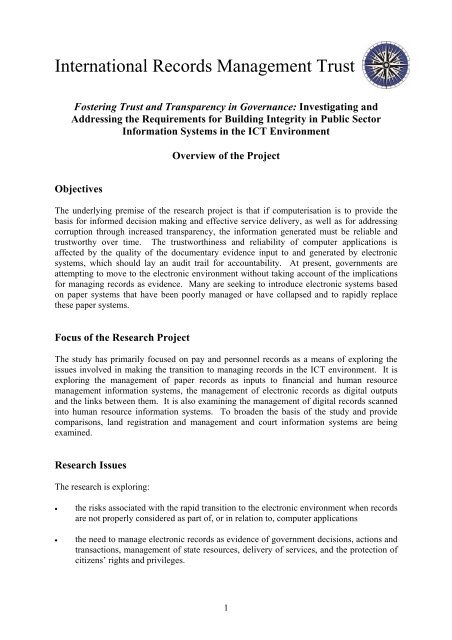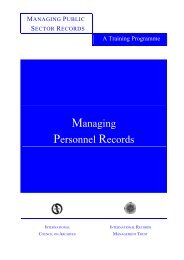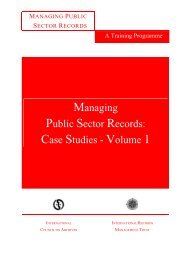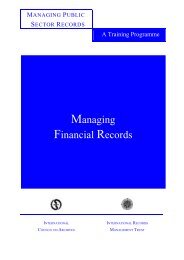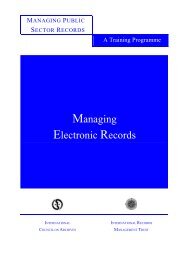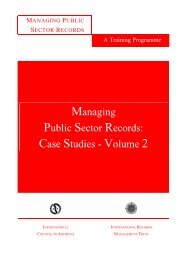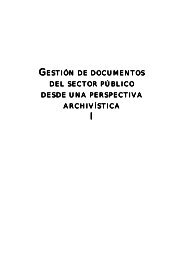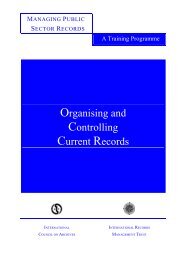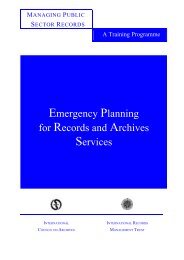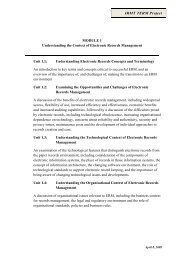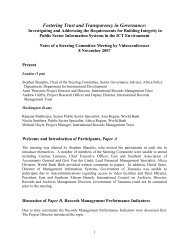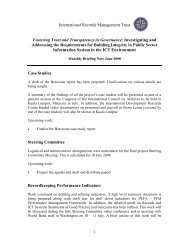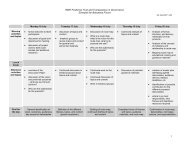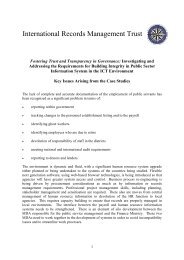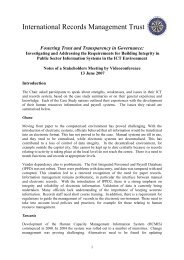IRMT Overview of the Project - Stakeholder Meeting.pdf
IRMT Overview of the Project - Stakeholder Meeting.pdf
IRMT Overview of the Project - Stakeholder Meeting.pdf
Create successful ePaper yourself
Turn your PDF publications into a flip-book with our unique Google optimized e-Paper software.
International Records Management Trust<br />
Fostering Trust and Transparency in Governance: Investigating and<br />
Addressing <strong>the</strong> Requirements for Building Integrity in Public Sector<br />
Information Systems in <strong>the</strong> ICT Environment<br />
Objectives<br />
<strong>Overview</strong> <strong>of</strong> <strong>the</strong> <strong>Project</strong><br />
The underlying premise <strong>of</strong> <strong>the</strong> research project is that if computerisation is to provide <strong>the</strong><br />
basis for informed decision making and effective service delivery, as well as for addressing<br />
corruption through increased transparency, <strong>the</strong> information generated must be reliable and<br />
trustworthy over time. The trustworthiness and reliability <strong>of</strong> computer applications is<br />
affected by <strong>the</strong> quality <strong>of</strong> <strong>the</strong> documentary evidence input to and generated by electronic<br />
systems, which should lay an audit trail for accountability. At present, governments are<br />
attempting to move to <strong>the</strong> electronic environment without taking account <strong>of</strong> <strong>the</strong> implications<br />
for managing records as evidence. Many are seeking to introduce electronic systems based<br />
on paper systems that have been poorly managed or have collapsed and to rapidly replace<br />
<strong>the</strong>se paper systems.<br />
Focus <strong>of</strong> <strong>the</strong> Research <strong>Project</strong><br />
The study has primarily focused on pay and personnel records as a means <strong>of</strong> exploring <strong>the</strong><br />
issues involved in making <strong>the</strong> transition to managing records in <strong>the</strong> ICT environment. It is<br />
exploring <strong>the</strong> management <strong>of</strong> paper records as inputs to financial and human resource<br />
management information systems, <strong>the</strong> management <strong>of</strong> electronic records as digital outputs<br />
and <strong>the</strong> links between <strong>the</strong>m. It is also examining <strong>the</strong> management <strong>of</strong> digital records scanned<br />
into human resource information systems. To broaden <strong>the</strong> basis <strong>of</strong> <strong>the</strong> study and provide<br />
comparisons, land registration and management and court information systems are being<br />
examined.<br />
Research Issues<br />
The research is exploring:<br />
• <strong>the</strong> risks associated with <strong>the</strong> rapid transition to <strong>the</strong> electronic environment when records<br />
are not properly considered as part <strong>of</strong>, or in relation to, computer applications<br />
• <strong>the</strong> need to manage electronic records as evidence <strong>of</strong> government decisions, actions and<br />
transactions, management <strong>of</strong> state resources, delivery <strong>of</strong> services, and <strong>the</strong> protection <strong>of</strong><br />
citizens’ rights and privileges.<br />
1
• <strong>the</strong> relationship <strong>of</strong> evidentiary requirements to reform objectives<br />
• <strong>the</strong> requirements for managing <strong>the</strong> records <strong>of</strong> key public sector functions in different<br />
media (paper, electronic, digitised).<br />
The Research Team members are examining issues that will help shape <strong>the</strong> deliverables:<br />
• What impact does records management have on <strong>the</strong> management <strong>of</strong> <strong>the</strong> government<br />
functions studied?<br />
• How does <strong>the</strong> loss <strong>of</strong> control <strong>of</strong> records contribute to corruption? What are <strong>the</strong><br />
opportunities for streng<strong>the</strong>ning anti-corruption initiatives, access to information and<br />
electronic government initiatives?<br />
• What are <strong>the</strong> risks for <strong>the</strong> governance process and services to <strong>the</strong> poor if paper and<br />
electronic records are not managed? What are <strong>the</strong> opportunities for streng<strong>the</strong>ning<br />
services to <strong>the</strong> poor by streng<strong>the</strong>ning <strong>the</strong> management <strong>of</strong> records, paper and electronic?<br />
• What can be done to create greater demand by citizens for records as evidence and<br />
greater political will in governments to introduce solutions?<br />
• How can records management issues be fed effectively into policy development,<br />
poverty reduction strategies and fiduciary risk assessments?<br />
• What are <strong>the</strong> causes <strong>of</strong> weak records management, paper and electronic? Why are <strong>the</strong>se<br />
issues not being addressed adequately? What solutions have emerged?<br />
• How applicable are <strong>the</strong> lessons learned in managing paper and electronic records in<br />
developed countries, where <strong>the</strong>re have been significant investments in finding solutions<br />
and how this knowledge can be adapted appropriately to a developing country context?<br />
Methodology<br />
Three approaches have been used to ga<strong>the</strong>r information:<br />
• Collecting qualitative information about public sector reform, electronic governance<br />
initiatives, pay and personnel and records management; this information, derived<br />
mainly from internet searches, documents and interviews provides background and<br />
context for <strong>the</strong> research. It also will provide an indication <strong>of</strong> <strong>the</strong> links between<br />
information processes and recordkeeping.<br />
• Mapping information flows. This is a valuable method for identifying weaknesses in<br />
systems. Inputs and outputs can be identified and <strong>the</strong> movement <strong>of</strong> information<br />
analysed. This helps to build a picture <strong>of</strong> <strong>the</strong> current processes and controls and<br />
provides a basis for understanding records management requirements.<br />
• Conducting quantitative research: As far as possible, samples <strong>of</strong> records are being<br />
examined to evaluate <strong>the</strong> quality <strong>of</strong> records from a systems perspective. For practical<br />
reasons, this can only be a small sample but one that will provide indicative findings.<br />
2
The sample should provide a basis for developing performance indicators that will help<br />
make it possible to measure progress towards improvements in recordkeeping in<br />
relation to objectives for public sector reform.<br />
Deliverables<br />
The project will produce four main deliverables that will be available without charge in <strong>the</strong><br />
public domain:<br />
• route map providing a sequence strategy for moving from a paper-based to an<br />
electronic information environment and linked to development targets<br />
• good practice guidance materials<br />
• training materials<br />
• database <strong>of</strong> case studies, with a report summarising <strong>the</strong> findings, as teaching and staff<br />
development materials.<br />
Location <strong>of</strong> Case Studies<br />
The Africa region is <strong>the</strong> principal study area. Case studies relating to personnel and payroll<br />
records have been undertaken in Lesotho, Ghana, Tanzania, Zambia and Sierra Leone. An<br />
additional study on financial, human resources and land information systems has also been<br />
undertaken in <strong>the</strong> State Government <strong>of</strong> Karnataka in India. By way <strong>of</strong> comparison a final<br />
study <strong>of</strong> manual and electronic land information systems will be undertaken in Botswana.<br />
3


